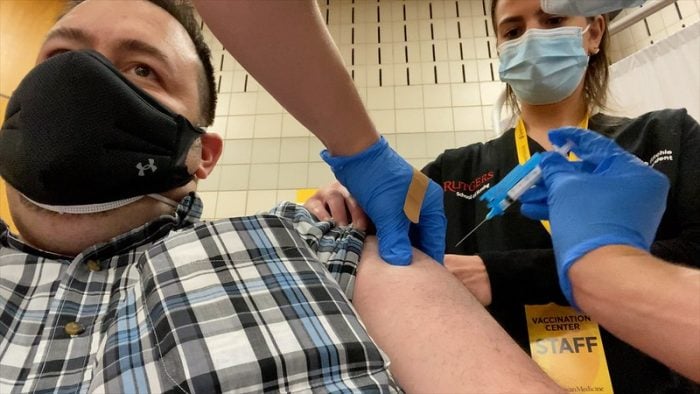*Editor’s Note: Elephant is not your doctor or hospital. Our lawyers would say “this website is not designed to, and should not be construed to provide medical advice, professional diagnosis, opinion, or treatment to you or any other individual, and is not intended as a substitute for medical or professional care and treatment. Always consult a health professional before trying out new home therapies or changing your diet.” But we can’t afford lawyers, and you knew all that.
~
Right now around the world, most of us are jumping at the chance to get a vaccine to protect us against the deadly and dangerous COVID-19 virus.
Strangely, the World Health Organization identified vaccine hesitancy as one of the 10 biggest threats to global health back in 2019 before Covid even started.
Vaccine hesitancy refers to “delay in acceptance or refusal of vaccination despite the availability of vaccination.” It has been around for as long as vaccines have existed and it happens for a variety of complex reasons ranging from misinformation (spread by social media today), lack of reliable information, and religious beliefs, or even just wanting reassurance that it is safe.
It has less to do with misunderstanding science (though there is a fair share of people out there who think vaccines are filled with god-knows-what harmful stuff), and more to do with mistrust of scientific institutions and government. People throughout history who have been harmed or oppressed by institutions in power tend to be the ones who are resistant to vaccines. And in the past, attempts to stop vaccine hesitancy failed because they relied on harsh and punitive measures that punished those who weren’t getting vaccinated, which didn’t help their cause.
How do we fix that?
We need to build trust and work on open and transparent communication with people we trust—and this is often family doctors who can help persuade and influence people to get vaccinated. The more people have those they trust in positions of power and influence sharing accurate and reassuring information regarding vaccination, that’s how we get through to those who are on the fence and unsure, and not do what the first vaccine laws in the United States starting in 1809 in Massachusetts did—with instigating mandatory vaccination laws, which caused resistance to grow because we all know that people don’t like to be forced to do something they don’t want to do!
The UK Vaccination Act of 1853, which was 30 years after Jenner (the inventor of the smallpox vaccine in 1796) died, was when smallpox vaccination was made compulsory with heavy penalties (fines or prison for those who didn’t get their babies vaccinated by three months old) for those who didn’t comply, and like today with the Covid-19 vaccine, it was seen by many to take away people’s personal choice and freedom and autonomy of what they could do with their body, which spurred an increase in the Victorian anti-vaccination movement.
This caused tens of thousands of people to protest in the streets with violent riots and others fought back by forming anti-vaccination groups. At that time, those who resisted vaccines were often poor and were suspicious of being forced to take part in medical intervention since normally they were often looked over for healthcare.
So you can understand why people were suspicious of vaccines back in the early to mid-1800s. But it’s the 21st century and a lot has changed—except, we haven’t evolved much as a species, biologically, from then. We still have primitive parts of our brains stuck on individual preservation and survival. And though a large number of the world’s population are desperate to get vaccinated because they know the benefits outweigh the risks, and it will allow them to be protected from the most serious side effects of the disease (hospitalization in ICUs and death), there are others still unsure and waiting and watching and wondering what to do. So we need to help these people and encourage them by continuing to get vaccinated so they see that really, it is the right thing to do, for all of us.
~ Caitlin McColl
Sarah’s Story
For the majority of my early adulthood, I was avidly against vaccinations of any and every kind. To this day, I will not even so much as get a yearly flu shot. Nor do I rely on over-the-counter or prescription medications to quell even the most innocuous symptom or minor ache. In fact, I would argue that I remain unshakably steadfast in my belief that the overall state of our well-being is determined by the health of the gut microbiome—or lack thereof.
I’ve listened to and read the research of various health experts who advocate plant-based living, and I believe in eating mindfully one hundred percent of the time. Awareness and various food intolerances have, over the years, propelled me to stick to a dairy, gluten, sugar, soy, and chemical-free lifestyle. I care for myself, Mother Earth, and for other living things on this planet and I try my hardest to embody that mindfulness in nearly every decision I make regarding what I consume, rub onto my skin, and what it is that I compost and recycle.
However, after this pandemic struck, I quickly began to see the writing on the wall. Although parts of me still remained resistant to the idea of getting the vaccination due to fear of any possible long-term side effects, I realized that I had to reevaluate my former position. I armed myself with pro-vaccine health officials, such as Dr. Fauci, and listened to the opinions of other highly respected individuals close to me whom I sometimes argued with. “I don’t want to use my body as some kind of lab experiment,” I protested.
Then, I read something that, after a bout of depression and a couple of health-induced panic attacks, significantly altered my outlook. I discovered that herd immunity is imperative in any attempt to restore our society and return to some level of new or prior pre-pandemic normalcy. According to WebMD, “herd immunity or community immunity, is when a large part of the population of an area is immune to a specific disease.”
At this point, the vast majority of us realize that vaccinations are the only way to achieve the numbers needed to achieve this.
The fact of the matter is, no matter how well you otherwise eat or live, there is no substantial evidence to suggest that taking Vitamin C, D, or Zinc supplements reduces your chances of contracting COVID-19. (And, I am, by the way, a huge proponent of eating highly nutritious foods filled with micronutrients and phytochemicals on a daily basis in order to reduce our risk of developing chronic illnesses, such as cancer, heart disease, or Type II Diabetes, for example.)
COVID, however, is an entirely different story, and let’s face it: if there were any weight to the argument that these micronutrients prevent or at least reduce our chances of contracting COVID-19, wouldn’t we all be increasing our intake of them and eating more healthfully, in general? Wouldn’t it follow, then, that if this were the case, the worldwide numbers would drastically fall? Why, then, is it not being recognized for being that simple? This isn’t the common cold—and no, COVID-19 is not, to quote some people I’ve heard, just a little bit worse than a case of influenza. The entire world doesn’t go into a state of lockdown over something a little worse than a cold or flu (for goodness’ sake).
We do not make the necessary antibodies to fight this virus, and if it were as simple as some of us believe it is, we wouldn’t have heard of so many younger and otherwise healthy individuals getting sick, dying in ICU, or incurring long-term side effects.
According to the CDC (Centers for Disease Control and Prevention), “Pfizer and Moderna are over 95 percent effective after two shots and over 80 percent effective after just one shot.” The CDC is also stating that this is, to quote, “the most compelling evidence to date.”
Also, I have found that many of the same folks who are against these vaccines are also many of the same people who are protesting the lockdowns and are crying about having their “civil liberties stolen (from them)” due to having to constantly wear face masks wherever they go. These same groups of people also don’t seem to produce any sound solutions to the problem rooted in any verifiable scientific evidence and yet continue to feel victimized nonetheless. They don’t trust the government, the news, or the CDC. They believe everyone is simply “out to get (them).”
Truthfully, I used to be one of those who believed that we were all being exploited and treated as human guinea pigs in some deadly “health” experiment, as well. But science and government aside, let’s examine these fears rationally: why would any government body or world health organization be trying to prevent the spread of disease by (potentially or not-so-potentially) creating new ones? How would that be in any government’s interest (on a global scale)?
Also, according to a different article from the CDC, “over 259 million doses of COVID-19 vaccine have been given in the United States from December 14, 2020, through May 10, 2021” and “the vaccines were evaluated in tens and thousands of clinical trials that meet the FDA’s standards for safety and effectiveness.” Furthermore, “results are reassuring,” with the overwhelming majority of people having zero or only mild side effects immediately following the jab.
We are being called to consider the interests and well-being of the collective—specifically our elderly and those with various chronic health conditions. We as decent and respectable human beings have a moral responsibility to do what is right by everyone, and sometimes that involves setting aside individual desires and comfort levels. The best thing we can do for ourselves, at this point in time, is to check our facts, verify them, and, yes, get vaccinated. We need to conquer our fears. Polio didn’t go away on its own and neither will COVID. The time is now.
We can do this!
~ Sarah Draper
For more from Caitlin and Sarah:


 Share on bsky
Share on bsky





Read 169 comments and reply